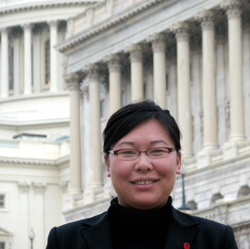 Courtesy of Peter Witzler
Courtesy of Peter WitzlerSeveral students, including a student at the Washington University School of Medicine, recently attended a summit in Washington, D.C. discussing the impact of HIV and AIDS in Africa.
Shijing Jia, a student at the School of Medicine and a member of the Physicians for Human Rights Student Chapter, attended the summit, which was held on Feb. 5 and Feb. 18.
She was joined by three other students from the Physicians for Human Rights Chapters in Florida, New Hampshire and Minnesota to discuss the topic of HIV/AIDS, women and human rights.
The event, which was organiazed by Physicians for Human Rights, included experts on women and AIDS from the United States and Africa.
“Physicians for Human Rights is about giving a voice to those who have none, educating about current issues from a medical perspective to break misconceptions and change policy,” said Jia.
There were more than 30 experts on the subject of women and AIDS present at the event, many of whom have worked both domestically and internationally to bring relief to those affected by the illness.
The keynote speaker was Stephen Lewis, a former United Nations special envoy on HIV and AIDS in Africa.
The students and professionals met with members of Congress and congressional staff to inform them of the plight of women and educate them on the problem of AIDS in Africa, particularly sub-Saharan Africa.
Of the experience, Jia spoke of the difference she felt that she and the others were making.
“The most important thing is that our voices as health care providers are valued on Capitol Hill and especially our opinions as students, because we compose the future of medicine and other fields. It is encouraging to see that politicians do care about what we have to say,” said Jia.
Physicians for Human Rights is using the Washington, D.C. summit to launch a new platform on the feminization of the HIV/AIDS pandemic.
“We are working to educate professionals and student about issues that make women especially vulnerable to AIDS,” said Pete Witzler, a spokesman for Physicians for Human Rights.
The group is calling for governmental action and advocating for the upcoming reauthorized United States AIDS plan to support and fund programs that advocate for women. Over the course of five years, Physicians for Human Rights is calling for $59 billion in support.
These funds would be used to run programs for women, such as microfinance and human rights training.
“The platform calls for policy that takes gender disparities into consideration, and for treatment/prevention to be targeted toward women, because they are now the population that shoulders the majority of new HIV infections in Africa,” said Jia.
Congress is currently considering legislation that would reauthorize President Bush’s Global HIV/AIDS Initiatives.
Physicians for Human Rights and other groups are asking for increased funding. The money would be put toward addressing the structural inequalities that leave women vulnerable to HIV and AIDS, investing in building health systems, forming evidence-based prevention strategies, and addressing the shortage of health workers.
Jia advises concerned citizens to contact their congressmen’s offices to let them know that AIDS is an issue the public cares about and to participate in advocacy events designed to educate the public and policy makers.
This week is AIDS Awareness Week, and the Washington University Medical School has planned activities that the public is welcome to join.
For more information, visit the School of Medicine’s Web site at medschool.wustl.edu.
-With additional reporting by John Scott.